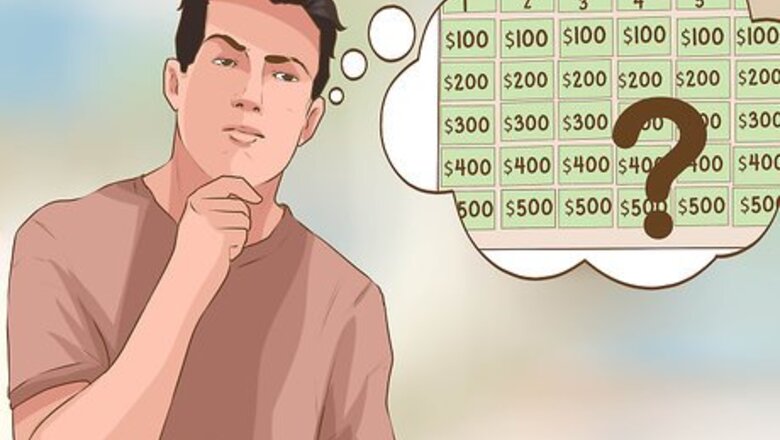
views
Making DIY Jeopardy! on Poster Board
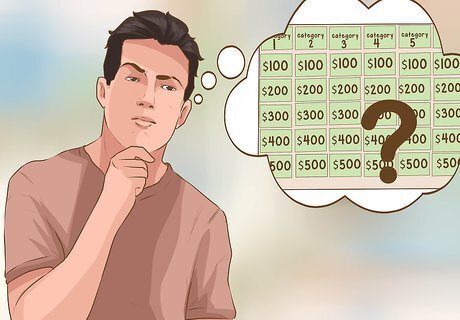
Make a list of six categories and five clues for each one. If you’re playing this Jeopardy! game as a way to study for your classes, use your school texts and notes to decide what the categories should be. Choose the major themes from the chapters that your upcoming exam will cover, for example. If this is a recreational game, you can either decide on the categories as a group, or the host alone can choose them. Whoever is playing the host of this round will be completing the rest of these steps.
Make an answer key for all your clues. As the host, you’ll need to create a list with all of the answers on a separate sheet of paper. Remember, in Jeopardy!, contestants are given the answer (the clue), and their response should be in question form. For instance, if your first category is “Code Names,” the clue may be something like “James Bonds’ Agent number.” Then, the answer would be “What is 007?” Use this answer key during gameplay to make sure that contestants are giving correct responses. Even if you’re creating your Jeopardy! board with a group of people, only the host should see the answer key.
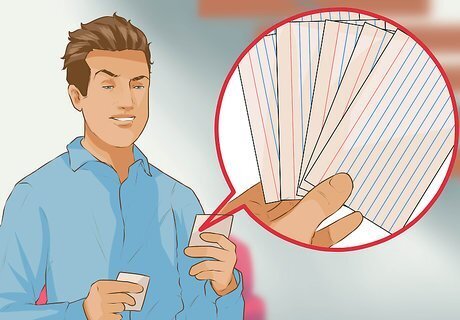
Write the name of each category on an index card. Use 6 index cards for the game categories. Write one category on each index card and pin those 6 index cards at the top of a sturdy piece of poster board. Line them up in a single row. Make sure to write legibly (or type and print out the text, if you prefer). You can also use a marker board if you don’t have a poster board on hand. Write the 6 categories at the top of the marker board and draw lines between them to separate the columns.
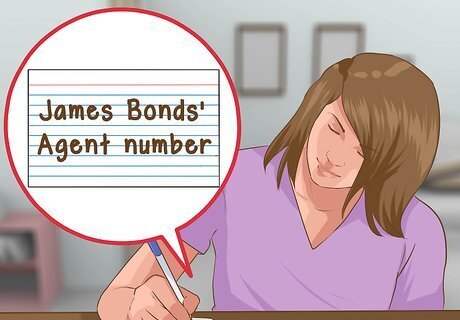
Write your clues and dollar values on opposite sides of 5 index cards. Take 5 new index cards and label them with dollar values: $100, $200, $300, $400, and $500. Flip over the $100 card and write your first clue for Category 1 on the back. The $100 question is the easiest one in the category. Repeat this process for the rest of the cards in the category, with the clues becoming more difficult as the dollar value rises. Write legibly, or type and print out the text if you want it to look extra nice.
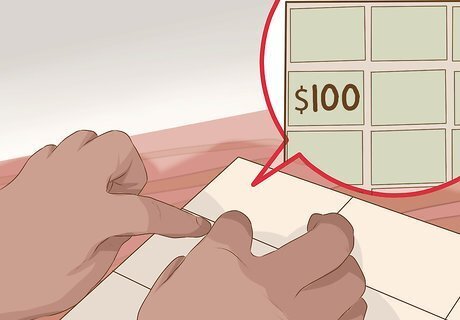
Organize the clue cards in columns underneath their category card. Pin all 5 clue cards for Category 1 directly underneath the Category 1 card. Pin the cards in a column in ascending order from $100 to $500. Make sure the dollar-value side of the card is facing out. Before you pin each card up, write the dollar value in its spot on the poster board so you can more easily keep track of dollars earned as the game continues. When the host pulls the card from the board to read the clue, the spot will be empty, but the dollar value will stay on the board. Once you get pretty far along in the game, this will help to give the board a little structure.
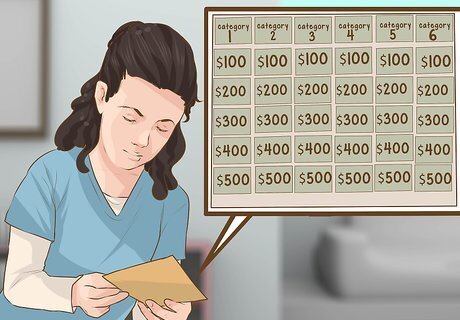
Complete all clue cards and pin them to create a 6x6 grid. Each category should have 5 index cards pinned beneath it. The clues should be hidden with the dollar values facing toward the players. At this point, the game is ready to play!
Making a Jeopardy! Game in PowerPoint
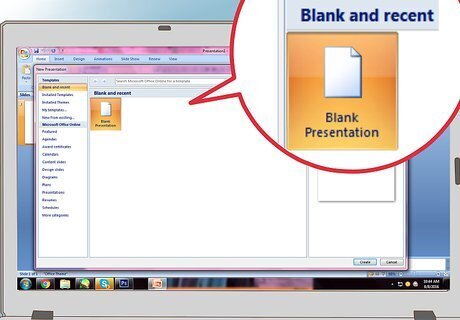
Create a title slide with the name of your game. Open PowerPoint and click Blank Presentation. Title the first slide with “Jeopardy! Game” (or any other title you want). You can also use this space to create a welcome message, insert images, etc. This slide will be the first thing players see during gameplay. Give your slides a little pizzazz by going to the Design tab and choosing from the Themes listed. You can even customize each Theme with your preferred colors and fonts, if you wish.
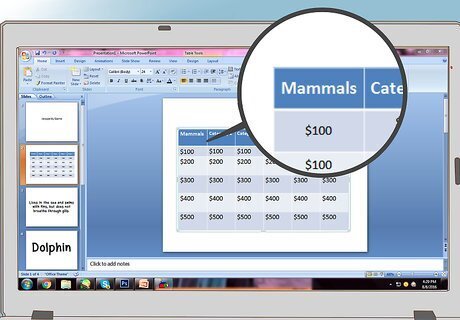
Create a 6x6 table on Slide 2 to use as your game board. Click New Slide to add a blank slide. Click Insert → Table. Add a table that has 6 columns and 6 rows (make a smaller table if you want a shorter game). Click and drag the corners of the table to resize it to fill up your entire slide. Write each category name in the top row of cells. Click on each box in the top row, type your desired category, then hit Tab to move to the next cell. In each column, write the dollar values in descending order below each category. In the first column, for example, the top-to-bottom cells may read [Category Name] → $100 → $200 → $300 → $400 → $500. Change the color scheme of your table by going to Table Tools → Design. Choose from the color options presented. If you’d like to customize any text, highlight it and hit the Home tab. From here, you can change font type, size, and color. You can also align the text to be centered in the box.
Create “clue” and “correct answer” slide layouts in the Slide Master tab. Go to View → Slide Master. Click Insert Layout and name it as “Clue.” Add an action button to the slide by going from Insert → Shapes → Action Buttons. Select the rightmost option—a “custom” action button—and draw it on the slide. Open the Action Settings window. Under Hyperlink to:, click the dropdown menu and select Next Slide Hit OK. Right-click the action button on your slide, press Edit Text, and add a caption like “Answer” or “What Is…” Insert another slide layout from the Slide Master tab and rename it as “Correct Answer.” Add another action button and select Slide 2 (your game board) on the Hyperlink to: dropdown menu. You now have two slide layouts: one for clues and one for correct answers. Having these slide layouts made will make it easier and more efficient for you to add clue and answer slides in the next step.
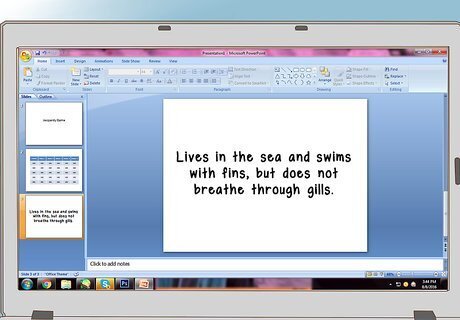
Use your slide layouts to create 25 pairs of clue-answer slides. Add a blank slide to your presentation. Select Layout → Clue. Add another blank slide and select Layout → Correct Answer. These two slides (Slides 3 and 4) make up one complete clue-answer pair. Duplicate these slides to create as many pairs as you have questions in your game board grid. For example, if you made a 6x6 grid, you’ll have 25 clues. You’ll need to make 25 pairs of clue-answer slides.
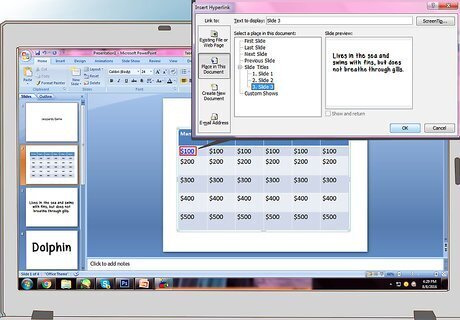
Hyperlink your clue slides to the corresponding squares on your board. Return to your game board slide. Right-click on the text in a cell (e.g., “$100”) and select Hyperlink. Click Place in This Document and select the slide where you’ll write the corresponding question. Click Ok to insert the hyperlink. Restrict navigation so that slides can’t be changed with mouse clicks. Select all slides and click on the Transitions tab. In the Transitions tab, look for the On Mouse Click checkbox and uncheck it.
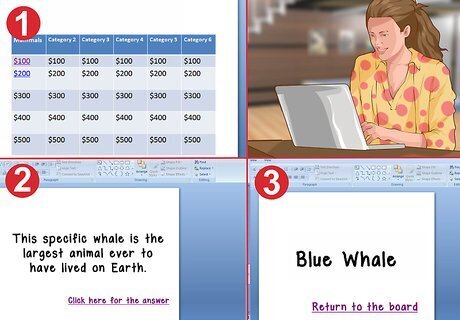
Fill in each clue and answer slide with your chosen questions. Go through each slide and type in your clues and answers. Make sure that a matching clue and answer are on adjacent slides and that the answer slide always follows the clue. Check your work by hitting F5 to enter presentation mode. Return to your game board. Click through each category and answer to make sure all your links work and lead to the correct clues and answers.
Personalize your Jeopardy! game by adding themes or media. You can make a PowerPoint Jeopardy! game as simple and bare-bones as you like, or you can get really creative with it. Add pictures to your clues by dragging and dropping pictures into the slide or clicking Insert → Pictures and uploading an image from your computer. Add music by selecting Insert → Audio and uploading an audio file from a free source like Musopen.org. Program the music to play automatically with Audio Tools → Playback → Start: Automatically. Add video clues by dragging and dropping a video into a slide or selecting Insert → Video. Set the video to autoplay though Video Tools → Playback → Start: Automatically. Add transition effects to any slides you like via Slide Master. For a particularly authentic game, add the Flip transition to correct answer slides so it looks like flipping a flash card.
Creating a Jeopardy! Game in Google Slides
Create a 6x6 game board on your first blank slide. Go to Google Slides and select Blank presentation under “Start a new presentation.” Go to the Slide menu and select New slide from the dropdown. Select any text boxes on the slide and delete them. Create a new text box and use your toolbar to customize it with a border—this is your first “Category” box. Click the corners to drag it into a rectangle shape and position it on your slide. Create another slightly smaller text box and place it directly underneath your first box—this is your first “clue” box. Duplicate it to create four additional boxes. Drag all these boxes into a column. Select all six boxes and right-click them. Select Copy, then click Paste five times to create a 6x6 game board. Enter your category titles (e.g., “History,” “English,” “Spanish”) in the first row of boxes, and write cash values (e.g., $100, $200, $300…) in descending order in each column.
Create your clue and answer slide layouts. Select View then Theme Builder. Press Ctrl + M to create a new slide and click Rename. Name the slide as “Clue slide” or something similar. Click OK. Select the shape button and select Callouts, then choose a fun shape like a star or cloud. Drag the shape into the lower-right-hand corner of your slide. Right-click your shape and select Link from the menu that appears. Choose Next Slide from the Link dialog box. Press Ctrl + M to create another new slide and repeat the above steps, except name this slide as “answer slide.” When you right-click your shape and select Link, choose Slide 2 (or whatever side your game board is on). Now, you have two slide layouts that you can use repeatedly to make all of the clue and answer slides that you need.
Use your slide layouts to create all of your clue and answer slides. Select New Slide → Layout → “Clue slide.” Create a text box and type in the clue. For example, your $100 clue under “History” may be “Even a century and a half after his death, he remains the tallest president in U.S. history.” Directly after this clue slide, create a new slide with the “Answer slide” layout. Create a text box and write the correct answer to this clue—which, in this case, is “Who is Abraham Lincoln?” Repeat this process until you’ve created all clue and answer slides. Make sure each answer slide directly follows its corresponding clue slide.
Create links between your game board and clue slides. Return to your game board slide and click on one of the dollar value boxes. Click the “link” icon in the toolbar. From the menu that appears, select Slide in this presentation and click the clue slide that you want to assign to that dollar value. Remember that the easier clues should have lower dollar values, and the difficulty of clues should increase towards the bottom of each category column. Repeat this process until all boxes in your game board (except the category titles) have been hyperlinked to their corresponding clue. As a shortcut, you can also hyperlink boxes by selecting them and pressing Ctrl + K. Customize your game as much as you’d like to by inserting images or changing the themes and colors of each slide. Then, you’re ready to play!
Using Online Jeopardy! Templates
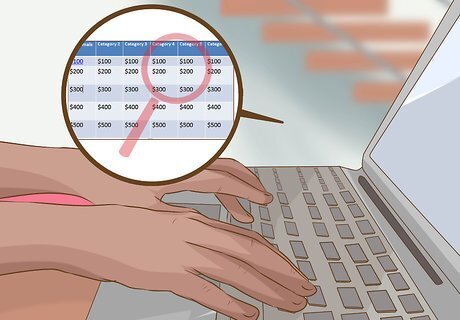
Search online for “jeopardy templates.” You will get pages and pages of hits. Some templates are fully customizable, while others will generate the clues/answers for you. You can download game templates for PowerPoint, Google Docs, or Microsoft Excel, or use one that a gaming website provides. These templates range from simple to elaborate. Do a little exploring to see what is out there. Jeopardy! game maker sites also allow you to make Jeopardy! games directly on the site; no template required.
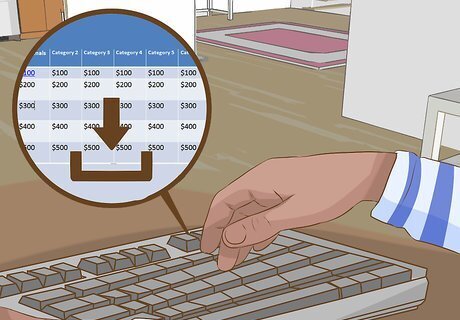
Choose and download a template to your device. After you’ve found a Jeopardy! template that you like, download it to your computer, mobile phone, or tablet. Some template websites offer versions for all possible devices, while others cater to a specific device type. These template files are not large, so download a few different ones that interest you. You can experiment with several until you find the right fit.
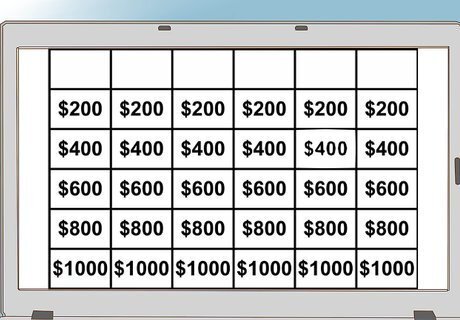
Open the template file and follow the prompts to set up the game. If you’re filling in all of the data yourself, start compiling your clues/answers. Follow the template's tutorial to complete and setup the game. If you’re playing this game as a way to study for a class, use your school texts and notes to decide what the categories should be. Select major themes or topics from textbook chapters to help you study for exams. If this is a recreational game, you can decide on the categories as a group or devise some other way to come up with them.
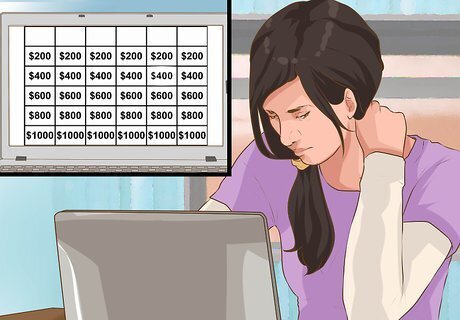
Plug all of the required data into your template (if required). Remember, the higher the dollar value, the harder the question should be, so increase the difficulty as the dollar value gets larger in each category. If you need to memorize vocabulary words, use those as your answers. The clues will be the definitions of the corresponding vocabulary words. Once the template is completely filled out, the game is ready to play.
How to Play Jeopardy!
Jeopardy! is a trivia game where players answer questions to earn money. Questions (or clues) are selected from six distinct categories. Each category contains five clues ranging from easiest to most difficult. Depending on its difficulty, each clue is assigned a dollar value (e.g. $200, $400, etc.). The object of the game is to be the player with the highest score at the end of the game. The game is typically played with a host and three contestants, although you can include more contestants or put them into teams.
On each turn, a player selects a question category and dollar amount. The host reads the clue, which is written in the form of a statement. The first player to “buzz in” must answer the clue in the form of a question. For example, a clue may be “The final color after mixing yellow and blue” or “The first president of the U.S.” The answer must be phrased as a question, such as “What is GREEN?” or “Who is GEORGE WASHINGTON.” If the answering player is correct, they earn that dollar value and select the next clue. Play continues until all clues have been revealed and answered. The second round of the game, known as Double Jeopardy, is played the same way but with new categories and doubled dollar amounts.
All contestants answer the same question in “Final Jeopardy.” Final Jeopardy is the final round of the game. A single category is revealed to players. All players (unless they have a negative score) must place a wager on whether they’ll answer the question correctly. Depending on their confidence in the category, players may wager as little as $0 or up to the entire current score. For example, a player who’s earned $1800 in the past two rounds can wager any number between $0 and $1800. Once all wagers are placed, the host reads the Final Jeopardy question. Players have one minute to write their answer on a piece of paper. After the minute is up, the correct answer is revealed. Players who wrote the correct answer win their wager, while those who answered incorrectly lose it. The player with the highest final score wins the game.
Sample Jeopardy! Categories & Clues
Pop culture Pop culture categories often include clues about current events and celebrity news. They may also ask trivia questions about popular movies, television shows, and music albums. Some example clues in this category could include: “The blonde preferred in Gentlemen Prefer Blondes” → “Who is MARILYN MONROE?” “Audrey Hepburn’s alternative to brunch in bed.” → “What is BREAKFAST AT TIFFANY’S?” “On one infamous late ‘90s sitcom, paleontologist Ross Gellar got divorced this number of times.” → “What is THREE?” “This 1920s war story film starring Clara Bow won the first official Best Picture Academy Award” → “What is WINGS?” “This actor has played both kings and villains after voicing both Darth Vader and The Lion King’s Mufasa.” → “Who is JAMES EARL JONES?”
Literature Literature categories on Jeopardy! will challenge a contestant’s knowledge of novels, poetry, and famous authors. Clues may cover both classic and contemporary works of literature. For example: “It’s the first name shared by bestselling authors Delinsky, Tuchman & Kingsolver.” → “What is BARBARA?” “During the Harlem Renaissance, she wrote Their Eyes Were Watching God.” → “Who is ZORA NEALE HURSTON?” “‘The Science of Deduction’ is chapter one of this Sherlock Holmes story.” → “What is THE SIGN OF THE FOUR?” “In 2019 this Rick Riordan title guy—“& the Olympians”, too—spent week 500 on the children’s series list, & that’s no myth.” → “Who is PERCY JACKSON?” “Daisy Buchanan’s cousin, he narrates The Great Gatsby” → “Who is NICK CARRAWAY?”
World History History, particularly American history, is a popular topic on Jeopardy!. These categories contain clues about presidents/government officials, wars, and social movements. Some example clues in this category include: “The start of the Persian Gulf War in January 1991 was known as Operation this.” → “What is DESERT STORM?” “This Hun got an annual tribute of 2,100 pounds of gold from the Romans.” → “Who is ATTILA?” “Heads up! Or off! The Reign of Terror ended in July 1794 with this man's execution.” → “Who is ROBESPIERRE?” “In August 2008, the Summer Olympics took place in this Asian country.” → “What is CHINA?” “New York’s original name was borrowed from this capital city in Western Europe.” → “What is AMSTERDAM?”
Science Categories related to science often specify a certain scientific discipline, e.g., biology, physics, chemistry, forensics, etc. More recently, technology and technological advancements make frequent appearances in science categories. For example: “All living organisms in an ecosystem.” → “What is a COMMUNITY?” “Water’s tendency to stick together.” → “What is COHESION?” “The functional group found in hydrocarbons.” → “What is a METHYL GROUP?” “Location of DNA in a prokaryotic cell.” → “What is the NUCLEOID REGION?” “These carbohydrate chains are located on the outside of the plasma membrane and give the cells a specific identity.” → “What are GLYCOPROTEINS AND GLYCOLIPIDS?”
World Geography This category includes clues on regional geography. Clues may ask about the topography, culture, history, and landmarks of different countries around the world. Example questions for geography include: “The city of Chiang Mai in this country is home to Baan Chang Elephant Park.” → “What is THAILAND?” “Wyoming’s largest lake, which lies right in the middle of a national park.” → “What is YELLOWSTONE LAKE?” “The King James Bible refers to it as the Salt Sea.” → “What is THE DEAD SEA?” “Not far from the resort of Cancun, the islands of Cozumel & Mujeres lie off the northeast tip of this peninsula.” → “What is THE YUCATÁN?” “Come visit Mongo /Not far from the Congo /Tibesti mountains are not that bad /Yes, we’re talking, talking ’bout…” → “What is CHAD?”
Food and Drink This category covers any topics related to food, drink, and cooking. Its clues may cover kitchen and cooking terminology, knowledge of cultural dishes, and notable chefs and cookbooks. For example: “The Scoville scale is used to measure the spiciness of this type of food.” → “What are CHILI PEPPERS?” “Lox is a fillet of the brined version of this specific sea critter.” → “What is SALMON?” “This distilled alcoholic spirit has an English name derived from a diminutive form of the Slavic word for water.” → “What is VODKA?” “This German side dish is made by finely chopping a cabbage and fermenting it with various lactic acid bacteria.” → “What is SAUERKRAUT?” “This popular two-word cable TV channel, owned by Discovery, offers shows such as Chopped and Iron Chef America. → “What is FOOD NETWORK?”
Art and Culture Art and culture categories cover anything related to art, music, and cultural traditions. The clues in this category are typically pulled from global cultures and challenge contestants’ knowledge on famous paintings, dance styles, and cultural festivals. Sample clues from this category include: “This Spanish artist is known for surrealist paintings like ‘The Persistence of Memory.’” → “Who is SALVADOR DALÍ?” “This American playwright won a Nobel Prize after writing works like The Iceman Cometh.” → “Who is EUGENE O’NEILL?” “This traditional form of Japanese dramatic theatre combines music and dance.” → “What is KABUKI?” “This musical instrument is shaped like a large, hollow wooden tube and is commonly used in Australian music.” → “What is a DIDGERIDOO?” “This annual festival known for colorful decorations and parades is meant to celebrate the Hindu god Ganesha.” → “What is GANESH CHATURTHI?”
Sports This athletic-minded category covers everything from team sports to individual sports to niche sports only played in a small part of the world. For example, here are some questions from a “Colorful Sports Teams” category: “One in the NBA and one in the NHL, these 2 pro sports teams are ‘golden.’” → “What are the GOLDEN KNIGHTS AND GOLDEN STATE WARRIORS?” “This Midwest NHL team that plays its home games at the United Center won the Stanley Cup in 2013 and 2015.” → “What are the CHICAGO BLACKHAWKS?” “This baseball team whose name includes a shade of red is also known as ‘the Redbirds.’” → “What are the CARDINALS?” “This U.S. pro soccer team sounds like an energy drink.” → “What are the RED BULLS?” “Boylston Street and Brookline Avenue will take you to the parking for their home games.” → “What are the RED SOX?”
Potpourri Potpourri categories cover miscellaneous topics on just about anything. Many Jeopardy categories are highly specific and can ask for trivia in pretty much any field of knowledge. Try a miscellaneous trivia section with questions like these: “In alphabetical order, the three spokesmen for Rice Krispies.” → “Who is CRACKLE, POP, SNAP?” “This Microsoft program was originally called Presenter.” → “What is POWERPOINT?” “This appetizer has flowered on the Outback Steakhouse menu since 1988–it accounts for 1 in 4 apps ordered there.” → “What is THE BLOOMIN’ ONION?” “Andrew Lloyd Webber wrote the music to the songs in Jesus Christ Superstar; this man wrote the lyrics.” → “Who is TIM RICE?”
Before and After On Jeopardy!, Before and After categories often combine two phrases or words that are connected by a shared word or syllable. For example, you may see clues like: “A stylish 1980 crime thriller starring Nancy Allen meets a 1960s novel featuring characters like Jean Louise ‘Scout’ Finch and Boo Radley.” → “What is DRESSED TO KILL A MOCKINGBIRD?” “Leo Tolstoy’s longest novel and the U.S. government’s most infamous international volunteer program, as dreamt up by President John F. Kennedy.” → “What is WAR AND PEACE CORPS?” “Where an attorney learns to be an attorney and a group of tuna in their natural habitat.” → “What is LAW SCHOOL OF FISH?” “‘Piano Man’ musician plus the star of hit sitcom Community.” → “Who is BILLY JOEL MCHALE?” “One movie featuring Fanny Brice working her way up to stardom and another set in an institution for mentally ill young women.” → “What is FUNNY GIRL INTERRUPTED?”
Rhyme Time This category asks contestants to name multiple prompted words that all rhyme. Often, the rhyming categories will specify a certain subject, e.g. “Fruity Rhyme Time” or “Triple Rhyme Time.” Here are some example clues for a “Zodiac Rhyme Time” category: “The sign of the crab is the response to a question.” → “What is CANCER ANSWER?” “A super funny archer.” → “What is HILARIOUS SAGITTARIUS?” “A new breed of dinosaur whose name means ‘bull lizard.’” → “What is TAURUS-SAURUS?” “The fishes’ frozen carbonated beverages in a variety of flavors.” → “What is PISCES ICEES?” “Partly from Latin for ‘crime,’ a wicked and immoral water bearer.” → “What is NEFARIOUS AQUARIUS?”



















Comments
0 comment